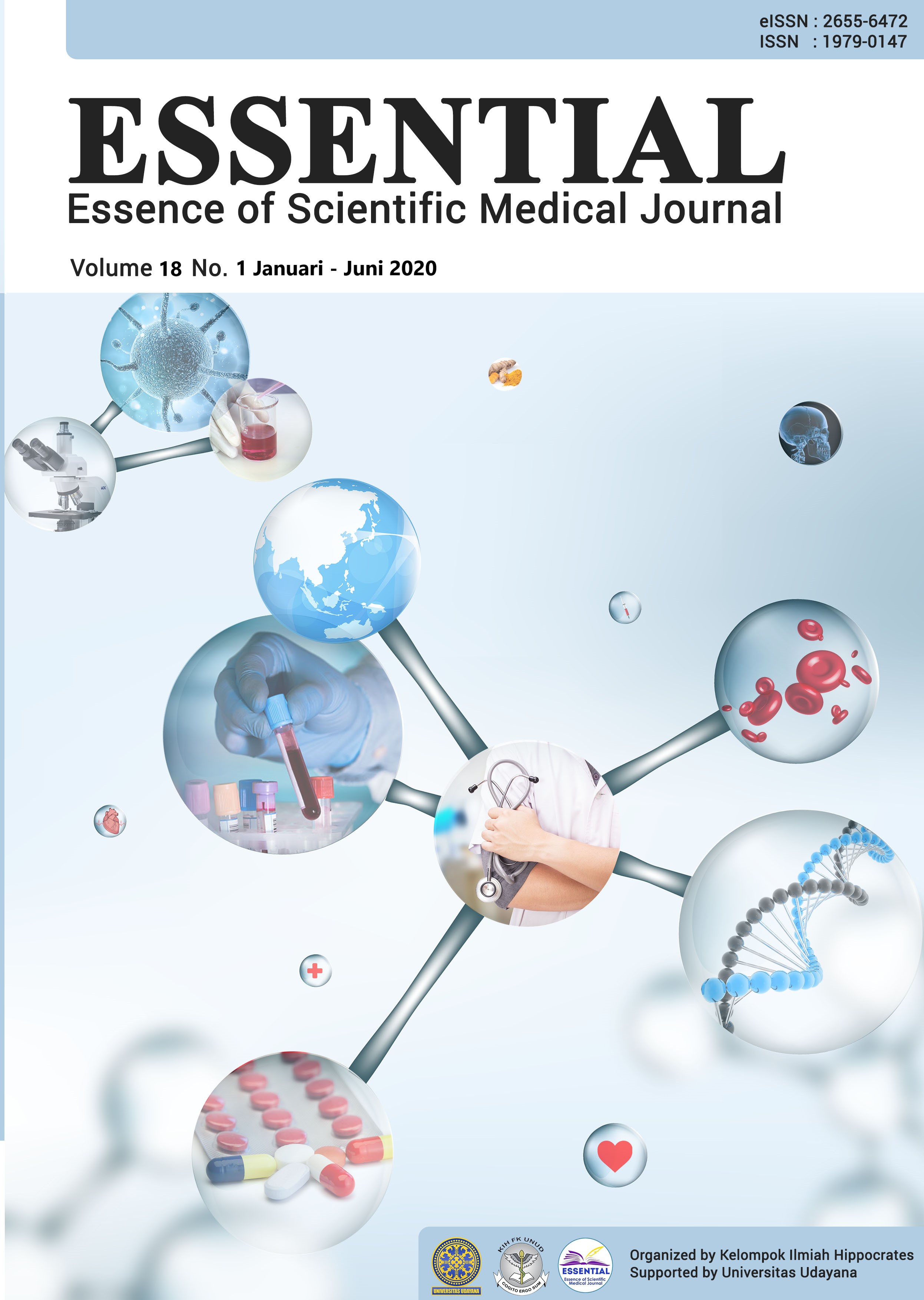CHIMERIC ANTIGEN RECEPTOR (CAR) T-CELLS THERAPY UNTUK PENYAKIT AUTOIMUN
MASA DEPAN PENANGANAN PEMPHIGUS VULGARIS
Abstrak
Introduction: Pemphigus vulgaris (PV) is a rare and potentially life-threatening chronic bullous autoimmune disease caused by the presence of desmoglein 3 adhesion protein autoantibodies. The most commonly used PV treatment remains immunosuppressants which have adverse effects such as increased immune responses and relapse later on. Therefore, innovative therapeutic strategy that more targeted and can prevent relapse in the long term are needed for autoimmune diseases treatment. eview current trends of CAR T-cell applications in PV. The objectives of this study is to review current trends of CAR T-cell applications in PV.
Discussion: The presence of autoantibodies against desmoglein 3 (?Dsg3) is commonly found in patients with PV. ?Dsg3 is localized to the mucous membrane and mucocutaneous. Autoantibodies appear due to overactivation of CD4+ Th2 cells. CAR T-cell is the result of the engineering of vector-assisted T cells that carry the chimera receptor according to what is targeted. This treatment with CAR T-cell is increasingly promising after FDA approval of two drugs for haematological cancer. Researchers are interested in developing CAR T-cell as a treatment for autoimmune disease. In vitro results from CAAR T-cell (which is modification of CAR T-cell) showed specific cytotoxicity activity against ?Dsg3 BCR. The results of the study in vivo discussed the potential for specific elimination of B cells Dsg3 based on serum and succeeded in maintaining epidermal integrity in mice.
Conclusion: CAR T-cell shows the potential to be applied as a choice for PV therapy in the future. Nevertheless, further development of the application of CAR T-cell is needed for PV therapy so that specific treatment options can be obtained with minimal adverse effects for patients
##plugins.generic.usageStats.downloads##
Referensi
2. Ellebrecht C, Bhoj V, Nace A, Choi E, Mao X, Cho M et al. Reengineering chimeric antigen receptor T cells for targeted therapy of autoimmune disease. Science. 2016;353(6295):179-184.
3. Cholera M, Chainani-Wu N. Management of Pemphigus Vulgaris. Advances in Therapy. 2016;33(6):910-958.
4. Porro A, Hans Filho G, Santi C. Consensus on the treatment of autoimmune bullous dermatoses: pemphigus vulgaris and pemphigus foliaceus - Brazilian Society of Dermatology. Anais Brasileiros de Dermatologia. 2019;94(2 suppl 1):20-32.
5. Han X, Wang Y, Han W. Chimeric antigen receptor modified T-cells for cancer treatment. Chronic Diseases and Translational Medicine. 2018;4(4):225-243.
6. Wilkins O, Keeler A, Flotte T. CAR T-Cell Therapy: Progress and Prospects. Human Gene Therapy Methods. 2017;28(2):61-66.
7. Kanwar AJ, Vinay K. Rituximab in pemphigus. Indian J Dermatol Venereol Leprol 2012;78:671-6
8. Dai H, Wang Y, Lu X, Han W. Chimeric Antigen Receptors Modified T-Cells for Cancer Therapy. JNCI: Journal of the National Cancer Institute. 2016;108(7).
9. Madala J, Bashamalla R, Kumar M. Current concepts of pemphigus with a deep insight into its molecular aspects. Journal of Oral and Maxillofacial Pathology. 2017;21(2):260
10. Dimarco C. Pemphigus : Pathogenesis to Treatment. Rhode Island Medical Journal [Internet]. 2016 [cited 30 June 2019];:28-31. Available from: http://www. rimed.org/rimedicaljournal/2016/12/2016-12-28-autoimmune-dimarco.pdf
11. Hammers C, Stanley J. Mechanisms of Disease: Pemphigus and Bullous Pemphigoid. Annual Review of Pathology: Mechanisms of Disease. 2016;11(1):175-197.
12. Takahashi H, Kouno M, Nagao K, Wada N, Hata T, Nishimoto S et al. Desmoglein 3–specific CD4+ T cells induce pemphigus vulgaris and interface dermatitis in mice. Journal of Clinical Investigation. 2011;121(9):3677-3688.
13. Español-Rego M, Marzal B, Juan M, Castella M, Boronat A. Future of Chimeric Antigen Receptors (Cars): Could it Drive Solutions Beyond Cancer? Examples in Autoimmune Diseases [Internet]. Pdfs.semanticscholar.org. 2019
[cited 2 July 2019]. Available from: https://pdfs.semanticscholar.org /48ab/192bdef6328fb84f861546e42ed20a3c204a.pdf
14. Miliotou A, Papadopoulou L. CAR T-cell Therapy: A New Era in Cancer Immunotherapy. Current Pharmaceutical Biotechnology. 2018;19(1):5-18.
15. Watanabe K, Kuramitsu S, Posey A, June C. Expanding the Therapeutic Window for CAR T Cell Therapy in Solid Tumors: The Knowns and Unknowns of CAR T Cell Biology. Frontiers in Immunology. 2018;9.
16. Tahir A. Is Chimeric Antigen Receptor T-cell Therapy the Future of Autoimmunity Management?. Cureus. 2018
17. Ellebrecht C, Payne A. Setting the target for pemphigus vulgaris therapy. JCI Insight. 2017;2(5).
18. Kotredes K, Gamero A. Interferons as Inducers of Apoptosis in Malignant Cells. Journal of Interferon and Cytokine Research [Internet]. 2013 [cited 2 July 2019];33(4):162-170. Available from: https://www. ncbi.nlm.nih.gov/pmc/articles/PMC3624694/
19. Hofrichter M, Dworschak J, Emtenani S, Langenhan J, Weiß F, Komorowski L et al. Immunoadsorption of Desmoglein-3-Specific IgG Abolishes the Blister-Inducing Capacity of Pemphigus Vulgaris IgG in Neonatal Mice. Frontiers in Immunology. 2018;9.
20. Zhang AH, Yoon J, Kim YC, and Scott DW. Targeting Antigen-Specific B Cells using Antigen-Expressing Transduced Regulatory T Cells. J. Immunol 18 July 2018
21. Kim M, Kim D, Suh S, Park Z, Choi M, Oh Y. Current status and regulatory perspective of chimeric antigen receptor-modified T cell therapeutics. Archives of Pharmacal Research. 2016;39(4):437-452.
22. Morgan R, Yang J, Kitano M, Dudley M, Laurencot C, Rosenberg S. Case Report of a Serious Adverse Event Following the Administration of T Cells Transduced With a Chimeric Antigen Receptor Recognizing ERBB2. Molecular Therapy. 2010;18(4):843-851.
23. Kalos M, Levine B, Porter D, Katz S, Grupp S, Bagg A et al. T Cells with Chimeric Antigen Receptors Have Potent Antitumor Effects and Can Establish Memory in Patients with Advanced Leukemia. Science Translational Medicine. 2011;3(95):95ra73-95ra73.
24. Xu D, Jin G, Chai D, Zhou X, Gu W, Chong Y et al. The development of CAR design for tumor CAR-T cell therapy. Oncotarget. 2018;9(17).
25. Kalantari-Dehaghi M, Anhalt G, Camilleri M, Chernyavsky A, Chun S, Felgner P et al. Pemphigus Vulgaris Autoantibody Profiling by Proteomic Technique. PLoS ONE. 2013;8(3):




